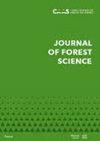Understanding psychological factors influencing ecosystem conservation behaviours of forest professionals
IF 1.1
Q3 FORESTRY
引用次数: 0
Abstract
This study was embarked upon to assess forest guards’ Knowledge, Attitude and Practice (KAP) behavioural change sequences in Nigeria lowland forest reserves using a structural equation modelling approach. Two research questions were raised and corresponding hypotheses were tested. From the data analysed, it was revealed that both knowledge and attitude variables significantly predicted the behaviour of the forest guards’ towards the management of the forest and its resources. Although the attitude variable on its own did not significantly predict the forest guards’ behaviours (t = 1.401, P > 0.05), it can be stated that the knowledge of the forest guards towards the forest is a better predictor to their environmental behaviours and their behavioural change sequence (AKP) is inclined towards developing affinity to the forest. Hence seminar and symposiums should be organized for all forest guards with the objectives of having better efforts and persistence, preparation for action, better visualization of success, reduce stressors, and fewer intrusive negative thoughts in managing the forest and its resources. This will help boost their affinity to the forest and self-efficacy as the study revealed that the Attitude-Knowledge-Practice (AKP) sequence explains better the behaviour of the forest guards in protecting the forest reserves.了解影响林业专业人员生态系统保护行为的心理因素
本研究开始使用结构方程建模方法评估尼日利亚低地森林保护区森林警卫的知识、态度和实践(KAP)行为变化序列。提出了两个研究问题,并对相应的假设进行了检验。从分析的数据来看,知识和态度变量都显著地预测了护林员对森林及其资源管理的行为。虽然态度变量本身不能显著预测林警行为(t = 1.401, P > 0.05),但可以认为,林警对森林的认知能较好地预测其环境行为,其行为改变序列(AKP)倾向于发展对森林的亲和力。因此,应为所有护林员组织讨论会和专题讨论会,目的是在管理森林及其资源方面有更好的努力和毅力,为行动做准备,更好地想象成功,减少压力因素,减少侵入性的消极思想。这将有助于提高他们对森林的亲和力和自我效能,因为研究表明,态度-知识-实践(AKP)序列更好地解释了森林警卫在保护森林保护区时的行为。
本文章由计算机程序翻译,如有差异,请以英文原文为准。
求助全文
约1分钟内获得全文
求助全文
来源期刊

Journal of forest science
Forestry-
CiteScore
2.30
自引率
9.10%
发文量
48
审稿时长
6 weeks
期刊介绍:
Original results of basic and applied research from all fields of forestry related to European forest ecosystems and their functions including those in the landscape and wood production chain are published in original scientific papers, short communications and review articles. Papers are published in English
 求助内容:
求助内容: 应助结果提醒方式:
应助结果提醒方式:


